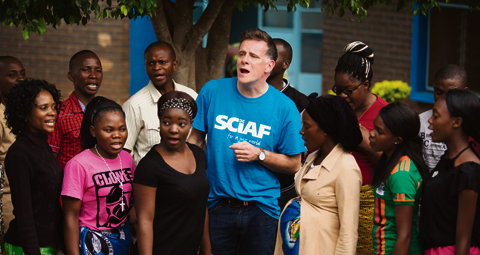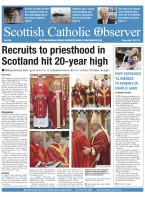April 13 | ![]() 0 COMMENTS
0 COMMENTS ![]() print
print

A LIFE LESSON ON DIGNITY IN ZAMBIA
Musician and presenter RICKY ROSS travelled to Zambia with SCO editor IAN DUNN earlier this year, and took time out to share his reflections on a remarkable and life-changing trip
From around the mid-1980s, every time you passed a radio in Scotland there’s been a decent chance of hearing Ricky Ross’s voice. Since his band Deacon Blue shot to fame back then, hits like Dignity have been in constant rotation—and then about a decade ago he reinvented himself as a radio presenter. His Radio Scotland shows, on country music on Tuesday nights and Faith on a Sunday morning, have brought him to a whole new audience. But no matter where you know him from, he wants you to listen.
“I’ll tell anyone: friends, fellow parishioners, anyone,” he says, “SCIAF are doing great work. If you’ve got any queries just ask me, but giving to their Wee Box campaign is well worth it.”
His evangelical enthusiasm for the charity was spurred from a trip he took to Zambia with them earlier this year (above left), visiting farmers who have benefited from SCIAF’s unique help.
“I think what sticks in my mind just being in the villages, more than anything else, is how basic they were,” he said. “I thought, people don’t really live that way, with thatched roofs and mud huts any more—things will have modernised by now; it’ll have changed. But that is how it is in the villages, and people were saying that’s how 70 per cent of the country live.”
“I’ve been to developing countries,” he said. “I’ve been to Brazil and some of what I saw was similar. There’s extreme poverty there, but that was in big conurbations. I didn’t realise it was still like that out in the country and I think a lot of Scots would be surprised.”
Ross is an exceptionally sprightly 59, and watching him dart about an African village, playing with the children and recording interviews, his enthusiasm seems boundless.
“All the things we’ve got, that they don’t,” he goes on, his passion turning serious, “are things we’d say are totally essential—water, electricity, transport—yet there is tremendous community and support for one another.”
One person he met in particular (above centre), stayed with him.
“There was a women I spoke with—Vaness—she was in this little village near Livingstone,” he recalls. “And we walked down to her land and she had a wee settlement and there were three incredibly cute grandchildren running around, chicks following the mother hen and it looked a bit of a rural idyll and she said to me: ‘If I could change one thing I would like water. We are miles from a water pump.’ And that had a huge impact on me. With all the wealth we have in the world it’s ridiculous that some people still don’t have easy access to water. There is a long way to go.”
Faith has been a constant part of the singer’s life. Raised in the Christian Brethren, he and his wife sent their children to Catholic schools and he converted to Catholicism in his 50s. One of the highlights of the trip was visiting Our Lady of the Angels parish in Livingstone on a Saturday afternoon.
“The place was buzzing,” he said. “These people were working all week, going to Mass on Sunday and there they were on a Saturday afternoon in their free time. There were three different choirs and whole extended families with older children looking after younger children.
“The music we heard that afternoon around the church was unbelievably inspiring.The songs they were choosing to sing had resonance,” he muses. “It was theology in practice; you could see them living their Faith through music.”
That lived experience of Faith is something he saw throughout his trip.
“At the start of all the meetings in the villages someone from the local partners would pray,” he said. “By custom the locals are asked if someone would like to offer a prayer and soon, one of the villagers stood and thanked God for the changes they have seen and for the life they now enjoy. Even before we heard their personal stories I was moved by the authenticity and simplicity of their Faith. Seeing and hearing gratitude from people who—in our eyes—have so little, is one of the most moving experiences I can recall. You could see that Faith was central to life here.”
The work of SCIAF’s partners, like Caritas
Livingstone—who are wings of the local Church—hugely impressed him. Much of it is focused on improving skills and promoting organic farming, which means local farmers aren’t dependent on buying expensive fertisliser.
“I met a bishop in Lusaka who had a very positive view of this work and he explained that this help wasn’t limited to those in his own flock, but was aimed at ‘empowering farmers to become better farmers,’” he said. “There was a Jesuit training farm where I met Br Paul—a very interesting guy. He’s a Canadian, came to Zambia 30 years ago and he said I’m not promoting this organic stuff as an add on—it makes economical sense.”
He also has great praise for Mutinta —a Caritas Livingstone organiser—who showed us their work in many villages in the south of the country.
“We got a wee glimpse into her life,” he said, “when we saw her singing in the choir. But all week it just shone through that she was just a really good person doing really good work”
He muses of the sound of the choir (above right).
“Music can make a huge difference,” he said. “When people’s expectation are stretched, when it’s life and death stuff on the margins, when they celebrate Mass they really celebrate it and their prayers seem more potent. When the margins are so tight it all seems to matter a bit more.”
Watching him sing with the choir, it was clear how humbled he felt to be allowed to sing with them and it’s clear it’s a memory he’ll never forget.
“You know,” he says, “the Church here in Scotland could do a lot worse than bringing Zambian musicians to do their music in all our churches.”











